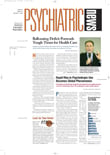Danish researchers have found that, on average, a patient's risk of developing dementia appears to increase by 13 percent each time the patient is hospitalized for major depression, or by 6 percent for each hospitalization for bipolar disorder.
The research, which appeared in the December Journal of Neurology, Neurosurgery, and Psychiatry, appears to complement other work over several decades that indicates some kind of cumulative physiological and/or anatomical insult to the brain with each subsequent episode, Lars Vedel Kessing, M.D., professor of psychiatry at the University of Copenhagen Hospital, said in a press release.
“Repeated episodes of depression or bipolar disorder may permanently alter brain tissue—known as the scar hypothesis,” noted Kessing.
The results point to the importance of early and sustained treatment to prevent worsening of symptoms, he and his coauthors concluded.
The study was funded by the Stanley Medical Research Institute and the Lundbeck Foundation.
The authors based their conclusions on records of hospital admissions for severe clinical depression or bipolar disorder between 1970 and 1999 in Denmark, where information on psychiatric illness requiring admission is kept in a national register. They reviewed records of patients identified in the registry as having been admitted and diagnosed with an affective disorder, including a “depressive episode/recurrent depression” and“ manic or mixed episode/bipolar disorder.”
At the time of the study ICD-8 or subsequent ICD-10 criteria were used in Denmark. The authors noted “for various reasons” that ICD-9 was never adopted in Denmark. The researchers excluded patients with affective episodes associated with organic brain disease, psychosis, or schizophrenia.
In all, nearly 19,000 patients with depression and more than 4,000 patients with bipolar disorder were identified as admitted to the hospital at least once and were included in the study. A diagnosis of dementia at some point after discharge following the initial hospitalization was strongly related to the number of previous admissions for the patient's depression or bipolar disorder.
Overall, the incidence of dementia was similar for patients with depression or bipolar disorder. A total of 337 (1.87 percent) of the patients with severe depression went on to be diagnosed with dementia during a subsequent hospitalization, whereas 97 (2.12 percent) of those with bipolar disorder went on to develop dementia.
However, the risk of developing dementia was more pronounced for those with depression than for those with bipolar disorder. For every new episode leading to admission, the incidence of dementia increased on average 13 percent for patients with depressive disorder and 6 percent for patients with bipolar disorder.
Kessing and his coauthors noted that their findings “are in accordance with the finding of an association between the number of depressive episodes and the risk of developing Alzheimer's disease” in one other longitudinal study, but contrast with the findings of a four-year study that found no significant association.
“It is possible that a follow-up of four years is too short,” Kessing noted. “Depression may act as a predictor of dementia, particularly so when there is a large interval between onset of depression and onset of dementia.” Kessing and his coauthors added that “no prior longitudinal study of bipolar disorder has investigated the association between the number of episodes and the risk of developing dementia.”
The implications, Kessing wrote, are clear. “If our results can be confirmed in future studies, they underscore the importance of early and sustained prophylaxis of the evolving process of the illness in both depressive and bipolar disorders.”
J Neurol Neurosurg Psychiatry 2004 75 1662
